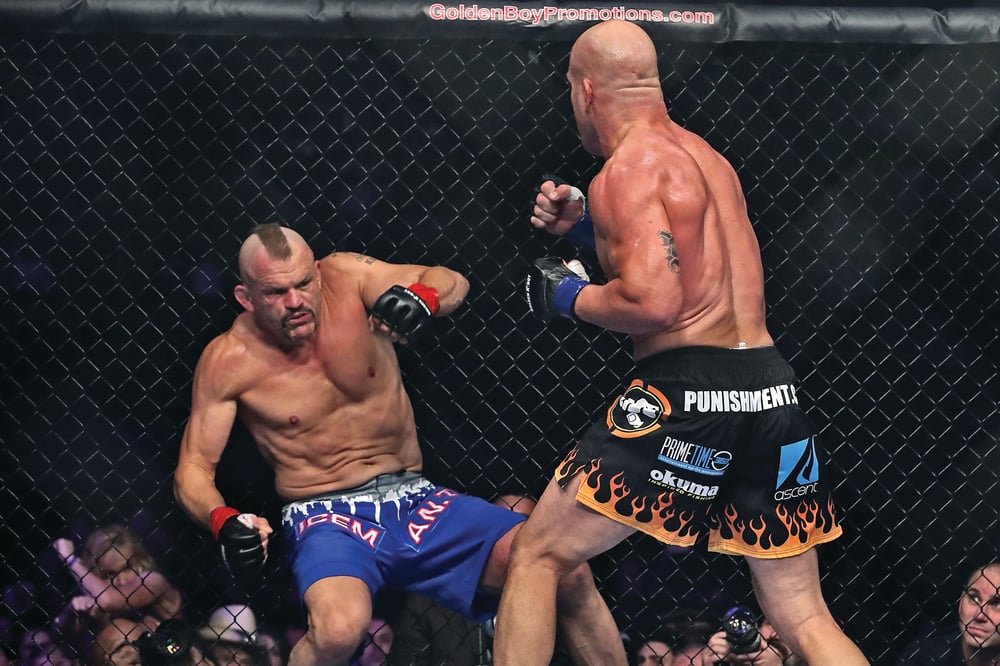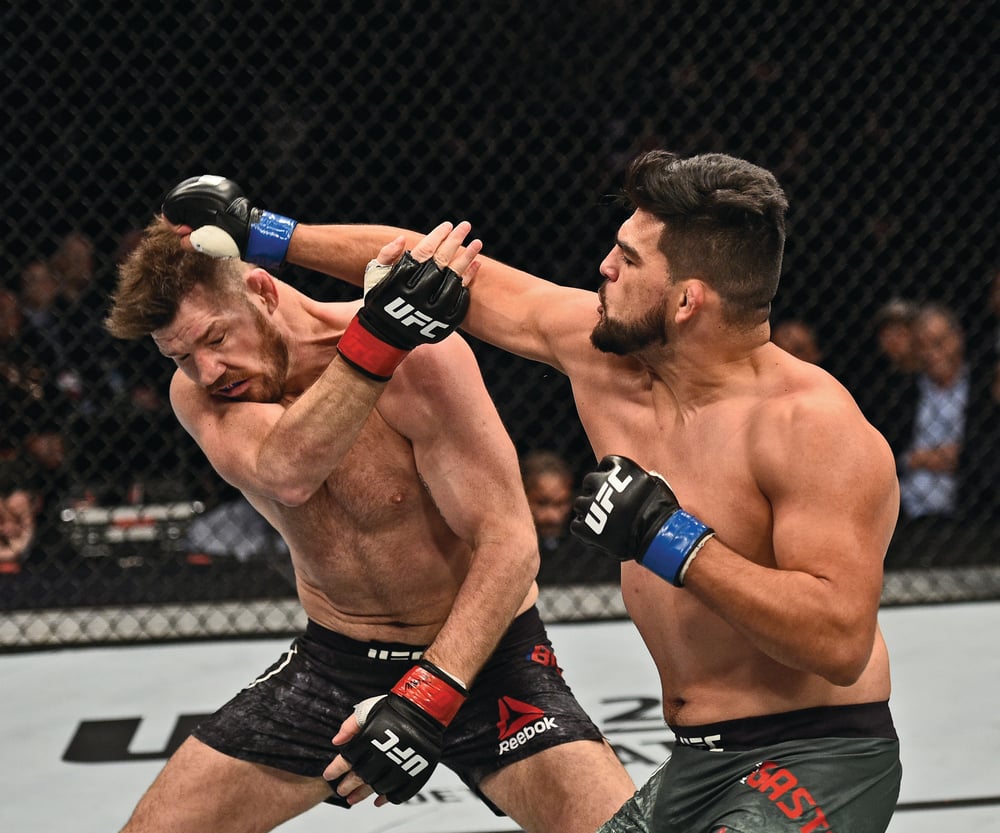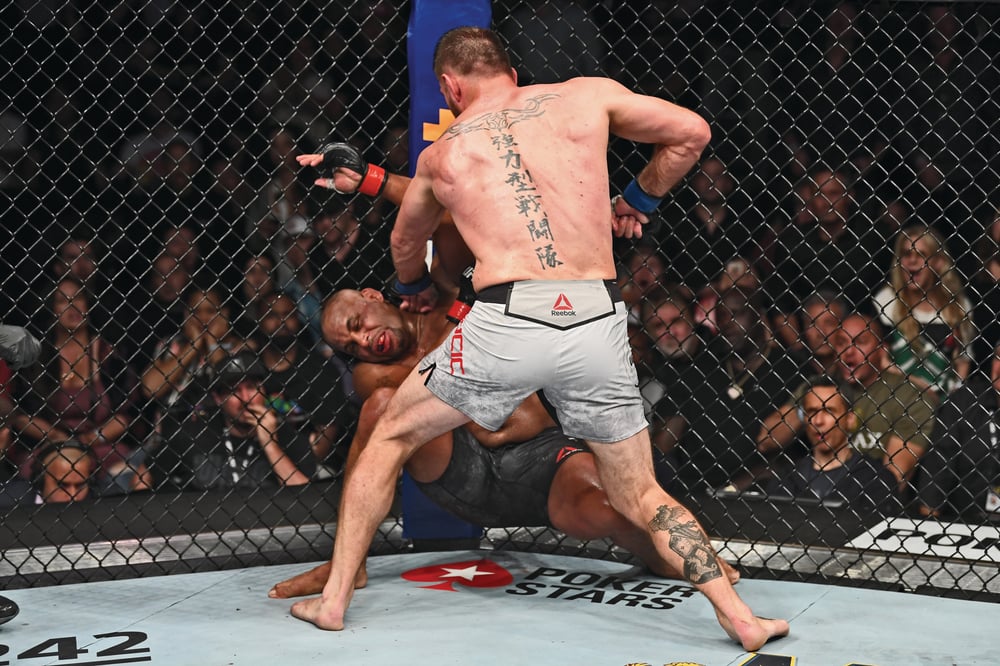
Issue 185
December 2019
When legends of the sport carry on for too long, legacies start to crumble and fighters risk serious injury. As BJ Penn implodes and even GSP is said to be considering a return, what can be done to save fighters from themselves?
Whatever happened to enduring legacies in mixed martial arts? What is it with the names we have revered – BJ, Chuck, Wanderlei, Fedor, Tito, Rampage – those who could be recognized with one name, going on and on and on with their careers, stretching the memories and the imagination to the point where their powers are so diluted they barely resemble the totemic, iconic status they once enjoyed in our mind's eye and in the live performances we witnessed. They carried our hopes, they allayed our fears; they almost soothed us like superheroes. But that has changed with the passage of time.
We are 26 years in now with mixed martial arts – or at least since UFC 1 and the birth of what has become a global industry – and legacies built are now beginning to crumble, to fade, as the generations shift, in fighting and in fans.

We have seen reports very recently of one of the sport's greatest legends, BJ Penn, getting knocked out in the street and then returning to attack the man who knocked him out in a bar fight. This is not the first time, either. There are fighters battling on for far too long and losing horribly, like Chuck Liddell, last year in a trilogy fight with Tito Ortiz, promoted by Oscar De La Hoya's Golden Boy Promotions. Remember, it was Dana White who famously urged Liddell to retire from active fighting, and found him a role as an ambassador at the UFC. When the company changed hands, there was a change for Liddell. Perhaps he needed the money, but on the evidence of his first-round knockout loss last November, his body clearly did not need the fight. What we saw was a ghost of the great "Iceman".
There is no doubt that BJ Penn needs protecting from himself due to his warrior soul. Street fights are simply an embarrassment, regardless of his pride. The facts, though, of what occurred on the night may need further inquiry, and there will be those in this day and age who say that those viral videos simply enhance his power with the fans. Street fighting, of course, made a name for the late Kimbo Slice, immortalized him even. And latterly, Jorge Masvidal's street fighting mentality and being raised from the same Miami scene as Slice has made the Floridian a fan favorite. The raw honesty has created plenty of heat for him. But there is another side to all this.

The viral videos out there of BJ Penn make ugly viewing, certainly for one so loved for his cage wars, and legendary status as a two-weight world champion in the UFC. No one has enjoyed seeing him claim victory just once in his last eleven fights going back eight years. Do these fighters really care, should we care, and should legacies be protected? How many fighters in MMA deeply care about their legacy in any form? The greatest legacies will be left to those who walk away, saddle up and leave town with all their wares intact. Arguably, Michael Bisping left in a classy manner, in spite of his last fight being a defeat. And Georges St-Pierre, for me, has arguably the greatest legacy in the sport. In the same vein, should Anderson Silva retire now while his is still intact, while we still remember that incredible run of victories when he etched himself into history as the greatest finisher of all time? Age, and decline, in the great Brazilian fighter, are now there to see. Statistics can lie, but Silva's last knockout victory was Stephan Bonnar in 2012, and 'The Spider' has had just one victory in eight fights since then. Yes, you are shaking your head. Little wonder.
In the same way, has Fedor Emelianenko, that once great wrecking ball of a heavyweight, already scuppered his great legacy and resume through the PRIDE years for his inability to hang up the hook on his decorated career? Those ten years when he was sublime are just fading. Perhaps the key is that it must remain a difficult thing to walk away readily, when that role has defined them for so long, and the pay checks are still hefty, if not still life-changing.
The legacy, be it good or even bad, is an oft-used term in fight sports, based around longevity and a storied part of a career. 'I want to leave a legacy, it's all about legacy fights now', we so often hear from fighters who have reached elite level, the pinnacle of the sport. Legacy is also about nostalgia, the brands we love, a familiarity, a sense of comfort, the things we have bought into before...but there is a limit on recycled goods in any store, in any field or industry. There has to be a breaking point.
For example, did Jeremy Horn ruin his legacy by going on and on? The American might not be the most well-known fighter to the mainstream, but he had 119 fights and 91 victories over a career spanning twenty years. Horn, deeply knowledgeable about fight sports, a coach as well as a fighter, stopped at the age of 40, in 2015. He fought Dan Severn, Frank Shamrock, was the only man to submit Chuck Liddell in his career, fought Randy Couture in Japan, Big Nog, had a win over Forrest Griffin, and beat Chael Sonnen no fewer than three times. It was a career that began in 1996, when the arts of mixed martial arts were very different.
Within the industry, Horn is revered in many ways, deeply respected. It is unlikely that new fighters in the sport will go on fighting for two decades, or having over a century of fights. His take on legacy, on fighting on and on, is interesting.
"Realistically, there's a level of competition in everyone. And I have a genuine love of fighting. But there comes a point when your age and skill and physical ability and the level you want to fight at flips because of the younger goes coming through." Then, he says, you know.

Michael Bisping is another with a lasting legacy, quite clearly the most accomplished MMA fighter Britain has ever produced, and indeed, as decorated as anyone in combat sports from the UK. There was a price, more of which from the great man himself in a moment, but this great character would probably not have had it any other way.
Bisping might have ended his career earlier, or at least when some were screaming from the rooftops that it was over, but then the Lancashire fighter would never have won the UFC middleweight crown, avenged defeats by Dan Henderson and Luke Rockhold, or even have a tick in the win column against Anderson Silva in front of home support, keeping a clean record – another legacy – of never losing on home soil.
Bisping persevered, and he accomplished all those things. The price? One prosthetic eye for the rest of his days.
As Bisping told me, when his aptly-entitled autobiography Quitters Never Win was published: "Having a career in fighting has enriched my life in ways I would never have imagined possible. That’s why I stuck around for so long. It was my security blanket and all I knew was fighting. I stepped away and it’s gone good so far.”
If he had not hung on, that win over Silva, a fight he always dreamed of having, would not have gold-lined the last days of his career. But now he is a UFC Hall of Famer, inducted this year.
“I didn’t understand what a momentous moment that would be for me. Before, I was kind of indifferent about it. But it felt great when I got there."
As the reality of life as a fighter dawns on him now in retirement, he revealed to me: “I sit back and watch myself now and I think Jesus Christ, what was this guy thinking? Where did this confidence and blind faith come from? Because now it’s so stupid and foolish to be risking my vision in my good eye, which I had done after the Kelvin Gastelum fight. That’s why I stepped away. To look back at that guy who was risking all that and still fighting at an elite level, it’s amazing.”
Speaking for so many of these fighters, Bisping told me: “I was never one to shy away from a confrontation. I’ve grown up massively. When I was younger I was totally fearless. I literally thought I could beat any man on the planet. You get older and grow up. I’m not the same man I used to be. I’ve mellowed.” Accepting that seems to be the key.

Arguably, the MMA fighter with the greatest enduring legacy in the sport, or indeed the cleanest break of any of the greats, remains Georges St-Pierre, the man who came back after a four-year absence to take the middleweight belt from Bisping in New York, and further his legacy by becoming a two-weight world champion, after being widely considered as the greatest welterweight ever.
He achieved his aim of becoming, in his words, the “most efficient, quickest-thinking fighter,” as he would write in his autobiography, "flexible, open-minded and ready for any situation" sums up his objectives.
But GSP was realistic about what he could put himself through. St-Pierre always had a strategy to unlock his opponents. It is how we remember him. Even now, of course, there is talk of St-Pierre being drawn back for one last fight against Khabib Nurmagomedov. It would be huge. The style match up is deeply intriguing. But St-Pierre has fought once in five years, is 38 years old, and Khabib is in the prime of his life.
Right there is the prospect of a legacy-wrecker. The last images of GSP should not be of him being mauled by a naturally smaller fighter. But there will be those excited about what the great GSP might be able to do. Might. Big 'might'.
John Danaher, a coach and adviser to St-Pierre in his prime, believes that it has to be a deeply personal decision. "Some people just can't walk away. They need the fame, they need the spotlight. They get used to a certain lifestyle and it's hard for them to take themselves away from that," he said, adding that it is "just a certain lifestyle switch they struggle with. Those desirable elements, those things that pulled you into that lifestyle in the first place, are taken away and the thing that defined you is no longer there anymore. Suddenly you've got to reinvent yourself and it's not easy for these guys."
Equally, Firas Zahabi, head coach to GSP, does not believe in encouraging fighters to retire. Unless their health is ailing.
"If the guy is healthy, I won't ask him to retire. If he isn't healthy, I'll ask him. That's the only time I'll intervene." St-Pierre's seven years at the head of the very best era of welterweights, avenging his losses in style, topped off by winning the middleweight crown, is certainly the way I, and many others, would love to remember him. King in 2013, returning king in 2017. Emeritus. Open and closed book.
For all those reasons, the clean legacy of GSP puts him in my estimation, along with many other observers of the sport, above even Jon Jones, Daniel Cormier, Nurmagomedov, Amanda Nunes, even Anderson Silva in the Mount Rushmore, the pantheon of all-time greats in mixed martial arts.
The staging of GSP's closure seems perfect. But who knows, the great Canadian fighter may yet be tempted back for a mega-millions fight with Khabib. Never say never, in this unpredictable fight world.

Another fighter who has tough decisions to make is Daniel Cormier. A modern great, 'DC' needs to make a decision on what direction to take with his legacy in mind. The sayonara he wanted with a heavyweight title fight against Brock Lesnar never materialized,
But there are two trilogy fights for him, sitting there, with Jon Jones and with Stipe Miocic. Right now, the Miocic fight seems to be the more likely. In my view, Cormier can walk away now with his legacy intact, but you almost feel the draw with what will be on offer. A win in either of those fights, and a straight walk-off will put him up there with a legacy not far off the shiny one which GSP left. Time will tell on that one... but Miocic vs. DC 3 is definitely brewing.
I recalled while writing this, a long conversation with former UFC light heavyweight Kyle Kingsbury. His greatest concern, quite rightly, was the health of fighters going on for too long. "I won't name names but I have training partners that are only a few years older than me and I see times where they slur their words or get hung up on the things they're trying to formulate. It's almost like when you're talking to one of your grandparents and they just stop mid-sentence."
Now retired, Kingsbury believes the Athletic Commissions should take a stance against those going on too long, and refuse their licenses to fight. "It's sad that guys can keep going as long as they want and certain commissions allow these old-timers to keep fighting. Like Ken Shamrock fighting when he was in his fifties. Ken should just not have been fighting."
UFC president White has said much the same with Penn. Fighters often do not lose the itch. They want to feel the heart rate go up again, the slowing of the moment. But the fact remains, there is a time to walk away. It's finite. We should not let them scratch that itch.
For their health, and their legacies, perhaps promoters, managers and commissions, need to protect fighters from themselves. Perhaps fighters will never accept that they have nothing left. Or indeed, nothing left to prove. Perhaps it is the same quality that helped them create, and then even dismantle, their legacies and let them fall from their grasp, like sand slipping through an hourglass.
...









